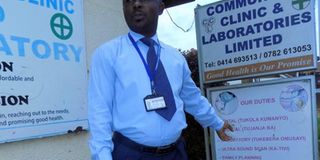From acting ‘doctor’ in school plays to real doctor

Sam Thembo Makenzi checks points to the signpost at his clinic’s premises in Wabigalo, Makindye Division, in Kampala. Photo by Joseph Kato.
What you need to know:
Childhood role. In school plays, Sam Thembo Makenzi’s favourite role was “doctor”. In the real world, he finds himself acting the same role, albeit this time for real, as Joseph Kato discovered.
While in primary school, Sam Thembo Makenzi acted the role of a doctor in school plays. Little could he picture that he was acting out his future. He remembers how he acted the role of a drug shop attendant in one of the plays and an old woman, who was sick but had no money to buy drugs, came in. Makenzi decided to offer her free treatment. The play ignited the emotions of parents.
Fast forward to present day, Makenzi owns a clinic in Wabigalo, a Kampala suburb. Dressed in a blue shirt, black shoes and a pair of dark blues trousers, we sit at the outpatients desk as he takes me through his business journey.
Makenzi reveals that when he joined secondary school, his desire to become a doctor grew bigger. He spent most of the weekends visiting a doctor friend, who operated a clinic in one of the neighbourhoods of Bundibugyo District.
There was a time when his colleagues who dropped out of school advised him to abandon education because there was no job for him.
Despite all the discouragements, Makenzi remained focused on his dream. He attributes his success to the advice his lecturer, Dr John Kyobe, a microbiologist researcher.
The lecturer told him to use the skills he had acquired to create his own employment. The advice sunk deep into his mind. Although he did not have money at the time to start up his own clinic, he swore not to disappoint his lecturer.
After graduating in Clinical Laboratory and Medicine in 2005, Makenzi was employed by another doctor, a gynecologist who had a clinic at Mukwano Arcade in Kampala.
He recounts when this doctor scolded him over some advice he had given him regarding how they could increase their clientele. His employer responded that he had enough knowledge to help himself, adding that he had started the business knowing its future.
“I felt demoralised by his statement because it made me feel “small”. From that moment, I began planning to become self-employed. Besides, he was paying me peanuts yet he was making a lot of money. I did not blame him because I did not know what he had gone through to establish the clinic.”
Starting up
In 2006, using some of the savings, he partnered with Dr Richard Ayebale to start up Grace Medical Clinic. They operated it together until 2010, when they decided to part ways.
“I bought a small drug shop from a midwife, who was working with Nsambya General Clinic, currently known as Mukwaya General Hospital. I bought the clinic at Shs1.8m and used Shs3m to renovate it.” This gave birth to Community Laboratory and Clinic and Laboratories.
Makenzi says life was difficult at the start because clients were few yet he had workers he was supposed to pay.
To cope, he had to forego many luxuries. He was always open to his employees. For instance, he used to ask them to be patient with him as he looked for money to pay them.
“Because of the good service we were offering, our clients kept increasing each day,” he notes. However, some prominent people would still doubt us because we were operating in a small room,” he recounts.
He remembers when a well-to-do man from the neighbourhood said he feared small clinics because they have substandard equipment and lack experienced staff.
Growing bigger
This perception irritated Makenzi because he was sure they had standard equipment and experience staff. He believes this man doubted their services because they were operating in a small place. This forced him look for a bigger space.
“The new place cost me Shs20m. I sold my clinic at Shs6m and borrowed Shs14m.
Since then, Makenzi has tasted some fruits of his commitment and determination.
Besides, its services have also been trusted by several school administrators in the above mentioned places to offer health services to their children.
In 2012, Makenzi thought of opening more clinics in the country, thereby registering Community Laboratory and Clinics as a limited company. Mid last year, he opened up a branch in Kasokoso in order to extend services to his clients.
Achievements
Some of the achievements Makenzi points out are creating employment opportunities to youths. Currently, his clinic employs at least 16 health experts, including general practitioners, accountants, receptionist, laboratory attendants, and enrolled nurses.
“I have also bought a car to ease my movements. Besides, we are currently purchasing the building in Wabigalo where we operate from at Shs90m,” he says.
Recently, the clinic partnered with the ministry of health to offer free testing and treatment of tuberculosis.
Future prospects
With time, Makenzi expects to extend services to other suburbs of Kampala. “I hope to purchase an ambulance by the end of next year. This is because we have schools which need our services. The ambulance will help us deal with patients who get illness that need quick response,” he says.




